
archives for 12/2015
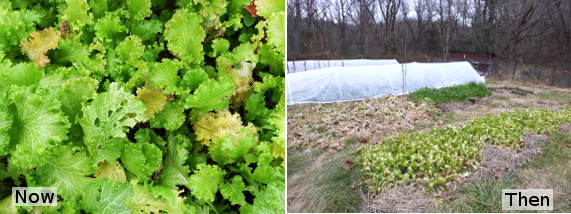
After a cold first frost, the rest of our autumn turned out to be relatively mild. Comparing photos taken in the garden Monday to those taken a year ago
shows a huge difference. For example, we're still eating only slightly
damaged mustard in the open garden, while last year's mustard was too
frozen to enjoy by this point.
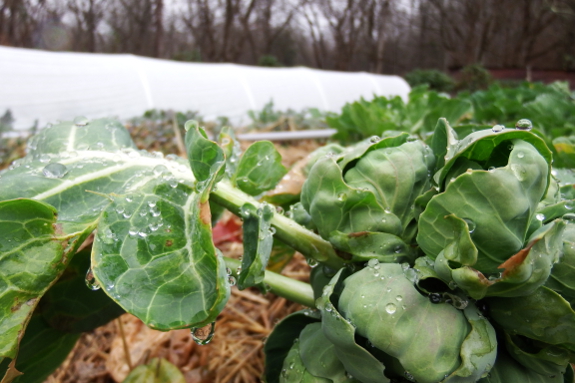
Similarly, our late
Brussels sprouts are bulking up dramatically, pushing me toward turning
this into a twice-weekly vegetable rather than a once-weekly treat.
"Maybe we should have
shared some of those with your family at Thanksgiving after all," Mark
conceded during our last sprout dinner. We looked at each other, then
chorused, "Or maybe not!" Yes, we're Brussels sprout hoarders.
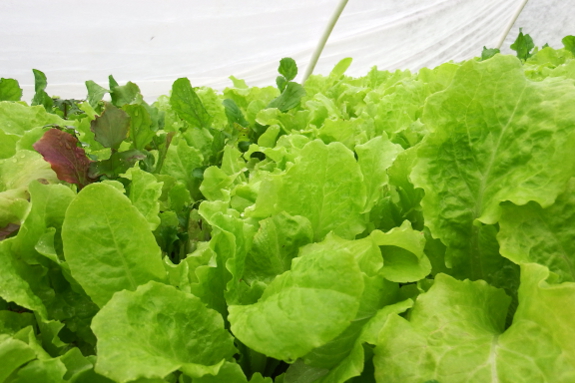
Under the quick hoops, the lettuce is growing like crazy. Technically, we've been in what Elliot Coleman calls the Persephone Days
for over a week, but I've recently concluded that his analysis of what
causes winter greens to stop growing is too simplistic. For us, day
length is less important than average daily temperature, meaning that
our greens will keep right on growing as long as they get enough warm
weather to keep their roots thawed. And, right now, that's still very
much the case.
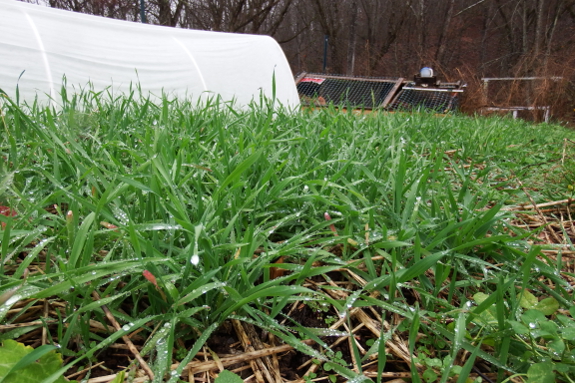
As one more data point in
our delightfully mild November, take a look at this rye, planted just
before Halloween. That's really too late to be seeding even this most
winter-hardy cover crop, but I figured I'd give it a shot anyway. And
the top matter is already taller in those late beds than it was in most
of our garden after an entire winter of growth last year.
Of course, our weather
changes on a dime. So we could have the world's coldest December ahead.
But, for now, I'm enjoying a winter in which the lowest low has thus far
been a fleeting 17, meaning that we've yet to burn any firewood other
than branches from the dead peach trees. Maybe this week we'll finally
split some real firewood.
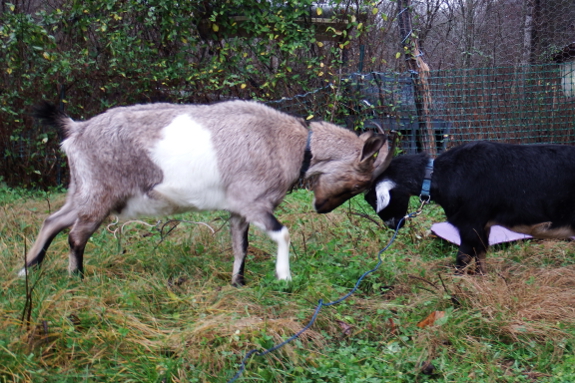
It's getting on toward
that time of year when the world is wet and our goats don't want
to stand in damp grass even long enough to pick honeysuckle off the
fenceline. I prevailed upon our little herd to go outside long enough
Tuesday to let me take some pictures, but they mostly made trouble
instead of eating.
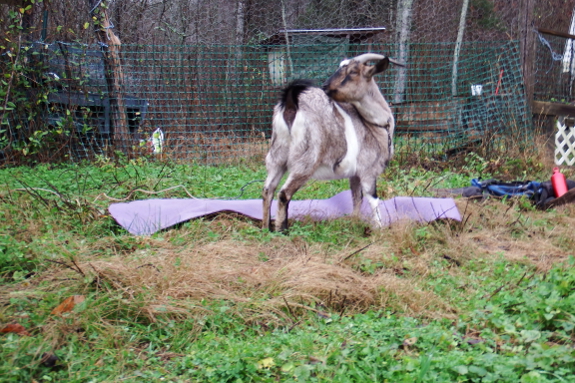
Abigail is completely dried off now, and I'm hoping she'll start packing on a bit of fat soon. After quitting milking cold turkey,
our doe's bag got bigger and bigger for about three days, although
Abigail mostly complained only during the first twenty-four hours and
before there was any real pressure at play. Like me, she's not a fan of
disrupted routines. By the end of the week, the milk was being
reabsorbed, and now her udder is about the size it was when we first
bought her. Drying off is officially a success.
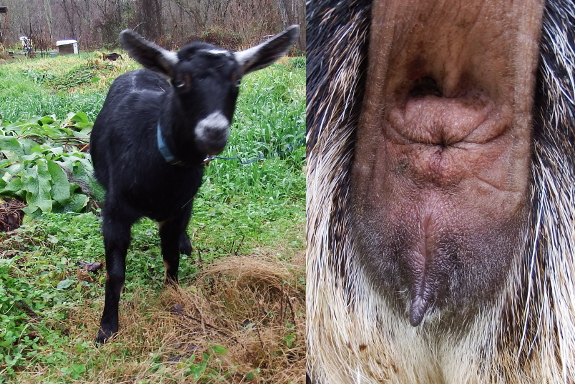
Meanwhile, Artemesia looked a bit befuddled when we brought her back from her driveway date,
but she's since bounced back...except that she still smells strongly of
buck. Now I'm peering at her butt regularly once again, this time to
see if I can note signs of early pregnancy. I realized in the process that the changes I'd seen in her butt
this summer and fall were symptoms of increasing maturity and heat
rather than pregnancy. Perhaps in a few more years I'll be reading goat
pooches like a pro. In the meantime, I'll be listening for yelling
around my birthday, hoping Artemesia pokes along into pregnancy instead.
And that's the news in Lake Wobegon, where all the goats smell strong, the cats are good looking, and our dog is above average.
One thing we learned while processing our last deer was that a big butcher knife is far superior to a hack saw and allows for a smooth chopping action when you need to cut through a bone.
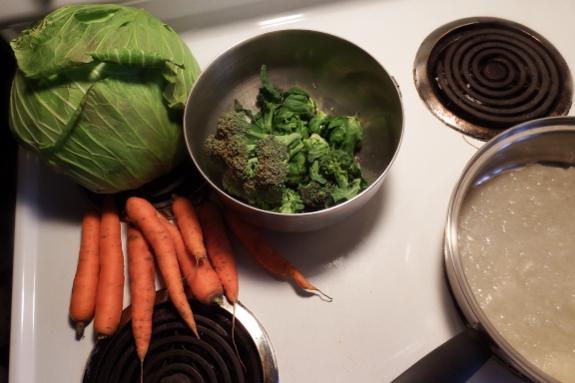
There are two schools of
thought on eking out summer and fall crops into the winter. School one
says that a homegrown tomato is better than a storebought tomato even
when picked green, and you might as well ration your storage vegetables
too so you have at least something fresh in February. I started out with this school of thought and managed to eat homegrown, raw tomatoes on Thanksgiving one year and carrots well into the spring. (Both tasted worse than store-bought near the end.)
School two says that it's
best to eat homegrown food while it's fresh. Pick a few turning peppers
and tomatoes just before the frost, but only enough that they'll be
thoroughly consumed by Halloween. Then hit your storage crops hard in
November and December so you get to enjoy carrots and cabbages at their
peak. I'm coming around to this school of thought and have been serving
lots of storage vegetables and garden-fresh greens this fall while
pulling nearly nothing out of the freezer.
Of course, the real
deciding factor in our meals at the moment is using up stock. I've been
socking the precious liquid away all summer, and two more gallons from
the Thanksgiving turkey means we really need to expand our soup
repertoire. Butternut, bacon, and turkey was a delight and scarlet
runner bean, corn, and sweet pepper perked up even my non-bean-eating
husband. What's next?
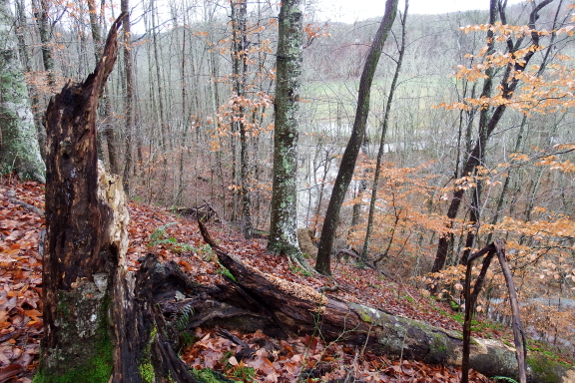
Three inches of rain in
three days meant the creek rose enough to spill slightly over into the
floodplain. Mark had to skip his second-to-last class of the year, and
we mostly stayed indoors and rested up from Thanksgiving. Four people-filled days meant that it took me nearly that long to feel normal again.
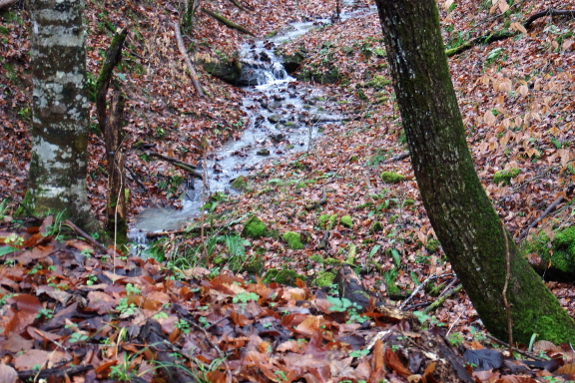
Lots of walks always
helps to clear the head. I asked the goats if they'd like to come out
with me, and they eyed me from the door of their barn as if I were
crazy. So Lucy and I enjoyed wet-weather waterfalls and the scent of
sodden leaves on our own. Nothing makes me happier than wandering among
trees with no people in sight --- an introvert's paradise.
Managing firewood gets a
little easier for us every year.
We moved our firewood
chopping and storage to the back working porch where the ground is
drier and the wood gets stored a bit closer to the wood stove.
"Nevertheless, I have a lot of questions and concerns about paying the bills without a full time job. We have 5 kids ranging from 13 to 2 years old so stability and being able to provide is important. I'm not afraid to get my hands dirty and we plan on raising goats, chickens, rabbits and bees. Plus gardening and canning as much as possible.
"I just assume that you guys are full time and if so, how do you do it? The feed for animals, property taxes, utilities, gas for the car? Any insight is greatly appreciated."
 That's
a good question, and one we touch on here from time to time. First of
all, I don't recommend that anyone try to make a living with farm
products on the modern American homestead. My mother and father did that
back in the seventies and eighties and the stress of raising three kids
while grasping at an unattainable dream eventually drove them apart. If
you want some more data points, check out this book by Eliot Coleman's daughter or this analysis of why the previous round of back-to-the-landers fled their supposedly bucolic lives within a handful of years.
That's
a good question, and one we touch on here from time to time. First of
all, I don't recommend that anyone try to make a living with farm
products on the modern American homestead. My mother and father did that
back in the seventies and eighties and the stress of raising three kids
while grasping at an unattainable dream eventually drove them apart. If
you want some more data points, check out this book by Eliot Coleman's daughter or this analysis of why the previous round of back-to-the-landers fled their supposedly bucolic lives within a handful of years.
(Although, to be fair, Joel Salatin makes a good living selling pastured
poultry and beef, especially now that he's become so popular. Still, I
suspect his hourly wage from farming is right around minimum wage.)
Luckily, times have
changed since then. If you select an inexpensive property in a
low-income area then leverage the internet to sell your skills to a
world audience, you can do well on a modern homestead. Our book Microbusiness Independence outlines our original method of achieving independence --- making and selling chicken waterers online. I'll admit that the SEO section of that text is now out of date, but the other strategies I recommend remain the same.
 Since then, we've expanded our income stream to focus more heavily on writing and becoming our own publishing company. Although geared toward fiction, I highly recommend this forum
for learning about self-publishing the smart way. Using strategies
gleaned there, writing has begun bringing home just as much income as
chicken-waterer sales in recent years. (I do publish a bit through a
traditional publisher, but the vast majority of our sales are from
self-published ebooks.)
Since then, we've expanded our income stream to focus more heavily on writing and becoming our own publishing company. Although geared toward fiction, I highly recommend this forum
for learning about self-publishing the smart way. Using strategies
gleaned there, writing has begun bringing home just as much income as
chicken-waterer sales in recent years. (I do publish a bit through a
traditional publisher, but the vast majority of our sales are from
self-published ebooks.)
Next, if you're more extraverted than we are, you might consider offering courses like Milkwood does in Australia or perhaps bringing vacationers to your homestead as a source of income. Finally, if you're having trouble brainstorming an online business model that fits your aspirations, How to Make Money Homesteading is a good place to start since the book offers dozens of ideas (although it paints with a very broad brush).
I hope that helps get you started. Figuring out how to manage a
homestead and a modern life style can be tricky, but the juice is very
much worth the squeeze. Good luck with your cabin in the woods!
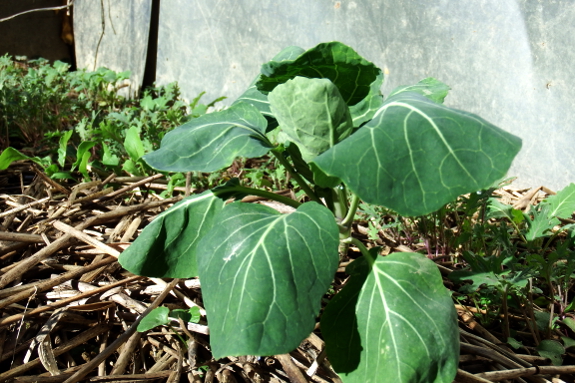
But this little guy in the cold frame was shaded by tomatoes and stayed stunted.
Perhaps he'll get big enough to bear sprouts by spring?
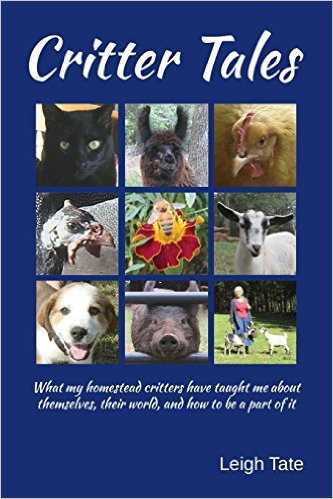 Did you enjoy Five Acres and a Dream? If so, you'll be glad to hear that Leigh Tate has a sequel out. Critter Tales details her experiments with chickens, goats, llamas, livestock guardian dogs, guinea fowl, farm cats, pigs, and honeybees.
Did you enjoy Five Acres and a Dream? If so, you'll be glad to hear that Leigh Tate has a sequel out. Critter Tales details her experiments with chickens, goats, llamas, livestock guardian dogs, guinea fowl, farm cats, pigs, and honeybees.
In the process, she's
realistic but sympathetic about the trials that face folks new to animal
husbandry in a farm setting. Readers follow along as she and her
husband jump through the emotional hurdle of killing beloved chickens,
figure out how to use water guns to train goats, and build innovative
strawbale shelters for pigs. Learning from her mistakes means you won't
be fated to repeat them, but at the same time the author's engaging
photos and stories will make you yearn to create critter tales too.
Before you know it, you may be juggling livestock guardian dogs,
chemical-free honeybees, and guineas of your very own.
Sound like your cup of
tea? Leigh has agreed to send a paperback copy of Critter Tales to one
lucky reader. To enter, follow the instructions on the rafflecopter
giveaway below. Good luck!
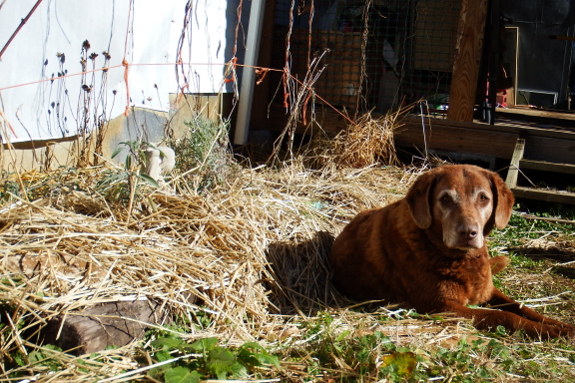
Look for the napping dog.

More frequent deep
freezes are starting to nip back uncovered growth. Time to put some of
those extra garden greens to use before it's too late.
I always overplant winter
greens because all kinds of things can go wrong with this final garden
of the year. If it's a warm fall, aphids can move in and make the older
plants unusable. A wet fall can promote blights. A cold fall means the
late plantings are stunted and fail. It's tough to deal with all of
these potential issues, so I just plant about four times as much as we
need and figure we'll almost certainly be swimming in greens.
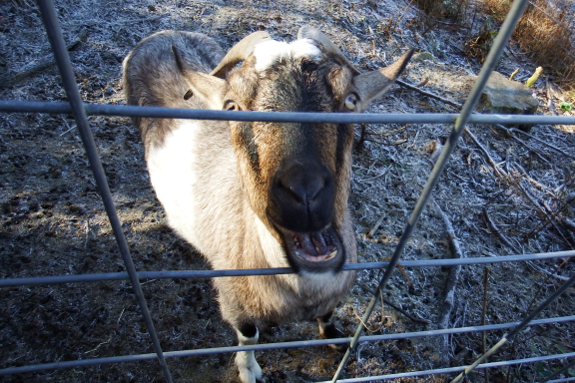
"If you need any help with that little problem, just let me know," Abigail says.
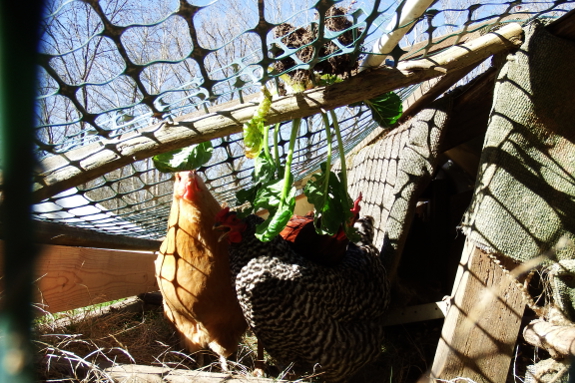
How about we start with the chickens first, hmmm, Abigail?
Anyway, as I was saying.... The tatsoi isn't long for this world, so I
don't mind pulling up whole plants for the critters. That makes it easy
to drape the greenery from the top of the chicken tractor so our cooped
up flock can enjoy a bit of fresh chlorophyll.
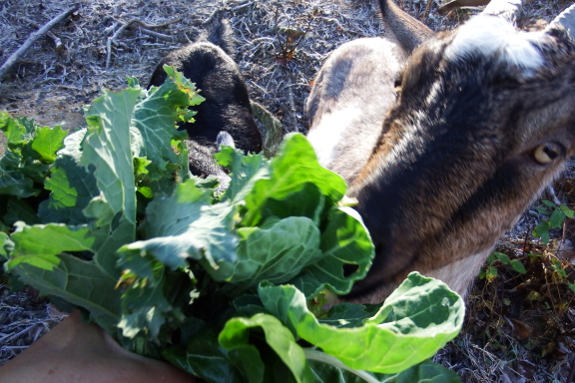
The herd instead got a
goat bouquet...or rather two bouquets since Abigail won't let her little
sister dine within a five-foot radius of her horns.
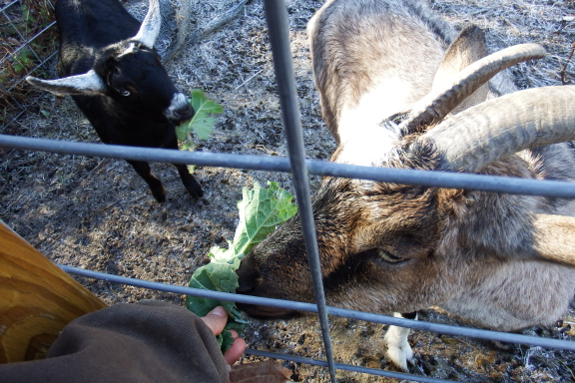
I pulled a little bit of
everything for our capricious buddies, but they were only interested in
the brussels sprouts tops and kale leaves. Perhaps the story would have
been different if they hadn't been gorging on butternut squash, sweet
potatoes, alfalfa pellets, hay, and fresh honeysuckle leaves earlier in
the day. But what can I say? Our goats live high on the hog and know
what they like. Swiss chard and frost-damaged lettuce are not it.
I guess the non-kale greens will go to the chickens. (Or to my mother!)
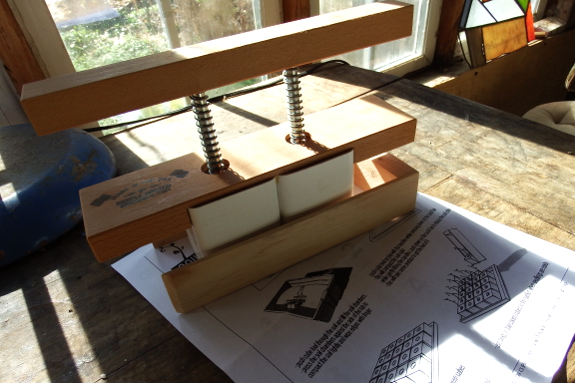
Deeply Rooted Organics sent us a soil-cube tool to review. (Thank you!)
The tool is well-crafted out of wood, metal, and plastic and is made in the USA.
We're looking forward to seeing how it does with stump-dirt in a few months.
Stay tuned for updates.
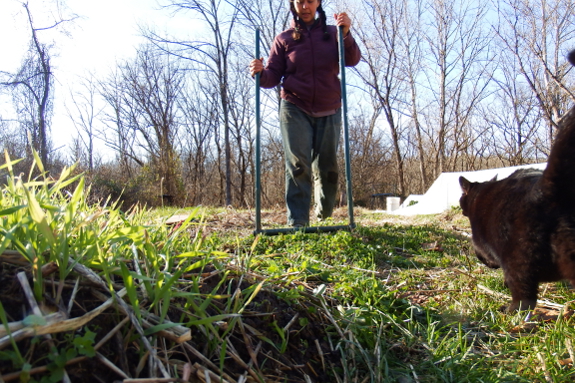
There's nothing like a sunny day to pull both me and Huckleberry out into the garden. He hunts voles while I continue broadforking and expanding the new bed in the mule garden. You can tell how long it's been since I got sidetracked from this project by the height of the rye in the foreground.
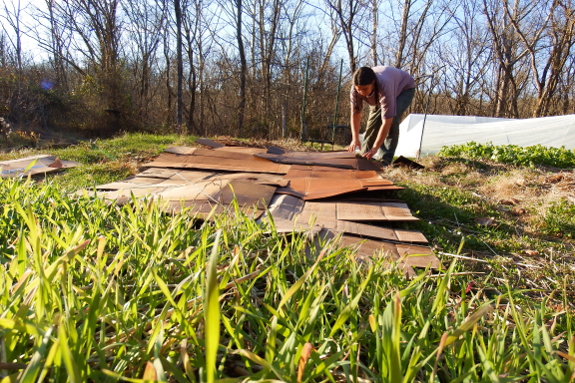
Mom kindly delivered a
carload of huge cardboard boxes a few weeks ago, and I used them all up
in short order. Next step --- moving dirt from shady beds to build up
this sunny zone.
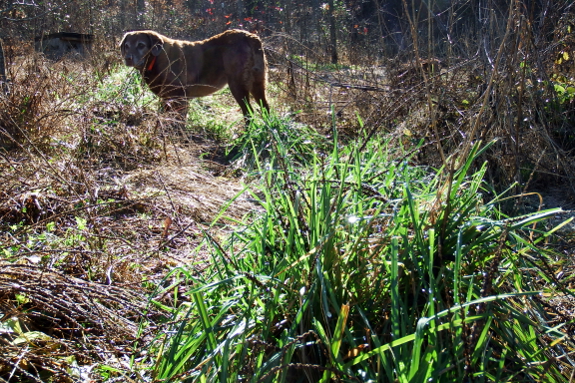
We sprinkled orchardgrass
seeds on a few bare spots last winter. The grass grew slow and the weeds
grew fast, so only a few clumps survived.
But the orchardgrass is staying green deep into the winter. Perhaps it has potential as late goat browse?
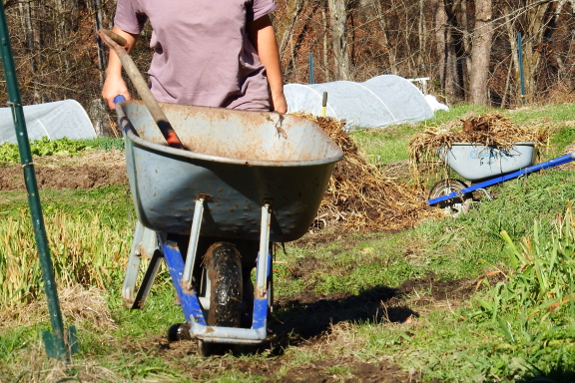
A really wet year in 2014 proved that our current fertilization source --- composted horse manure
from a neighboring farm --- isn't sustainable. Yes, it's a waste
product at the source and makes our garden thrive, but if we can't get
the manure from point A to point B we're sunk. So one of my big goals
for 2015 was to to work on homegrown compost. To that end, I've been
gathering piles of weeds all summer, and now it's finally time to build a
compost pile.
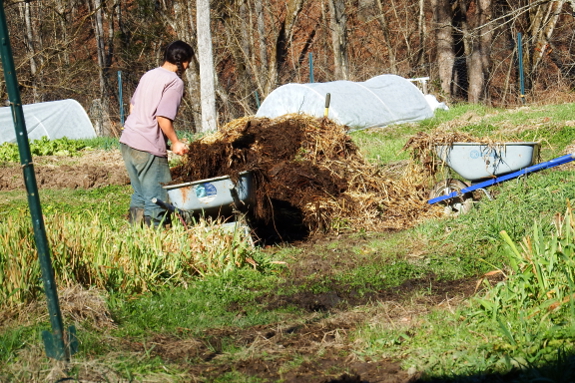
I didn't take any photos
on day one, so just pretend what you see here is starting on the ground
instead of on the side of an already built compost pile. That said, the
first layer consists of partially composted summer weeds...
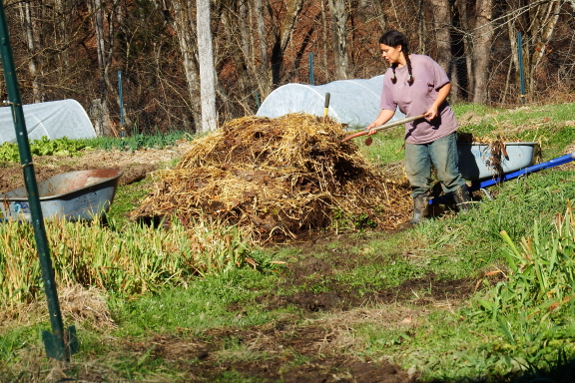
...onto which I sprinkled a thinner layer of bedding from the chicken coop to boost nitrogen levels...
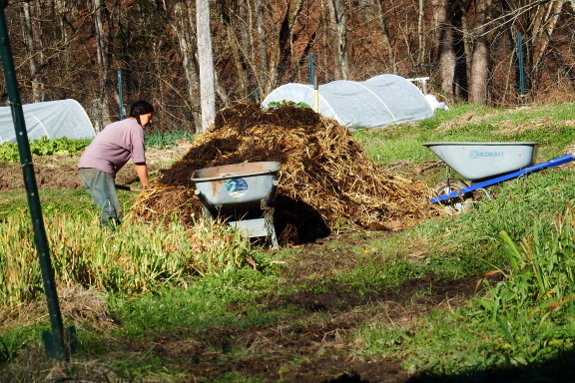
...then I added a layer
of 2/3-composted weeds to inoculate microbes and other critters. After
many wheelbarrows of each ingredient and quite a few layers, I had a
huge pile of incipient fertility.
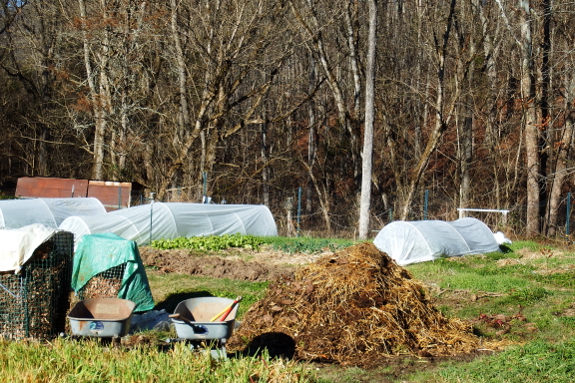
I wasn't done yet,
though. Since over half of the compostables had been under cover, the
pile needs a couple of rains before I'll cover it up and let it cook.
During that time, I'll also pour on as much urine as we can come up with
to help the compost heat up enough to kill weed seeds. I'm not counting
on that effect, but it sure would be nice. Finally, if I get cabin
fever in February, I may turn the edges into the center to ensure
complete composting.
Since I know this pile
won't be nearly enough to feed our 2016 vegetable garden, I've got more
tricks up my sleeve. Coming up tomorrow --- playing with goat poop! With
a preview like that, how could you stay away?
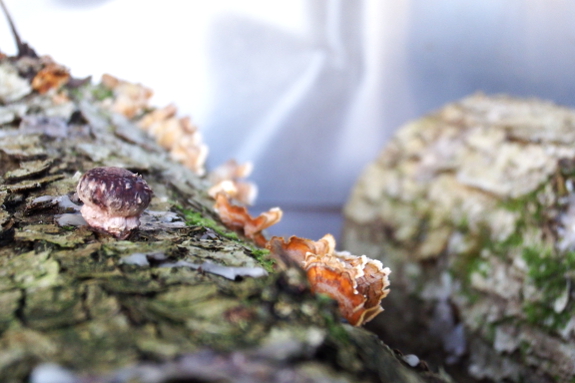
The oaks we thinned out of the woods to make our shiitake logs were struggling when we cut them.
Perhaps that's why so many weed fungi have popped up along with the shiitakes?
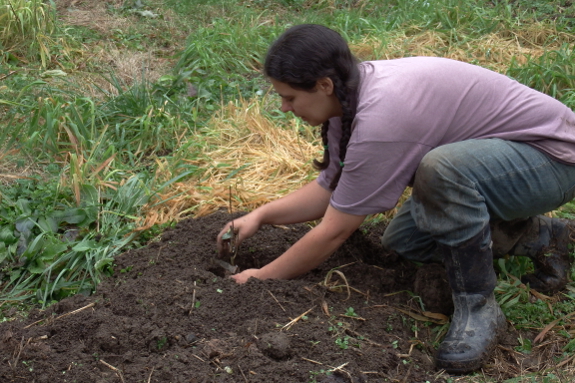
This spring's graftees didn't grow as vigorously as in year's past. I think the issue was mostly that their row
was a bit too shady, but the deer-nibbling session in midsummer didn't
help either. Still, I suspect they'll do fine now that I've moved them
to more secure and sunnier spots.
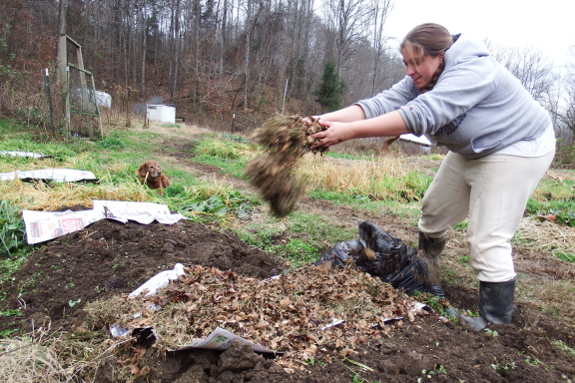
Kayla and I transplanted eleven little apples Wednesday, mulching just around the bases of the trees then planting rye
in between. It's way too late in the year for even that winter-friendly
cover crop, but it's been such a mild season I figured I'd give it a
shot anyway. If the rye gets overwhelmed by weeds, I'll just kill mulch
in the spring and start over.
The only thing better than apple-planting day is Kayla-visiting day. Combining the two makes for a perfect afternoon.
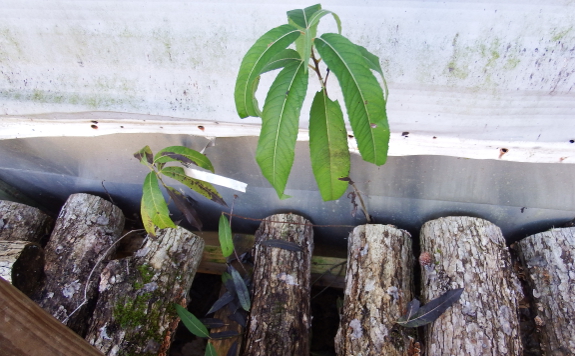
The willow cuttings rooted well and are just starting to lose their leaves.
The goats were attracted to the color green and had to be guided away from the future living sculptures.
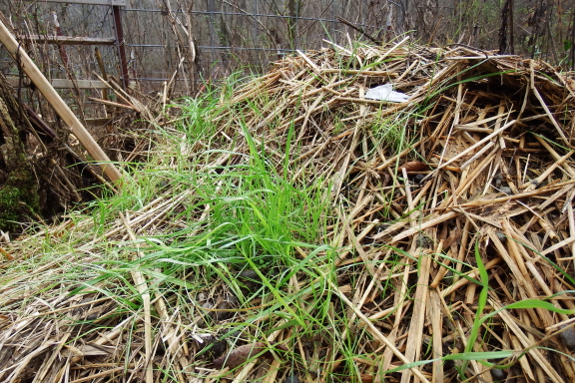
Phase one of our homegrown fertility campaign is the garden/kitchen/chicken compost pile. But that isn't nearly enough to make it through the year. Enter phase two: the goat compost pile.
The photo above shows the
problem with goat manure. Our dainty eaters drop nearly as much hay
onto the floor as they eat, and that spoiled hay is full of seeds. If
those seeds sprout on the compost pile, it's not a bit deal. But nobody
wants a lawn in their garden.
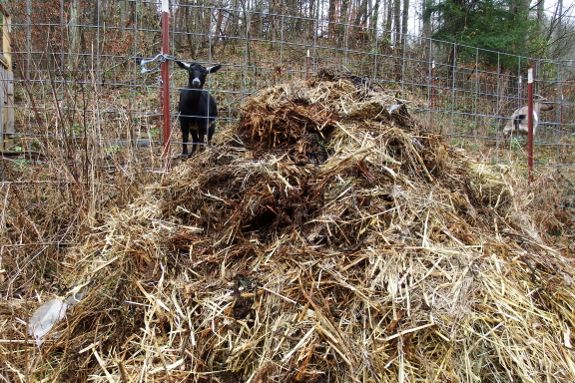
Now, this isn't really as
big a deal as I assumed it was at this time last year. After putting
uncomposted goat manure on the garden all summer, I realized that it
really wasn't any weedier than the composted horse manure we'd been
using to date. But I've still decided to earmark the goat manure for
large-seeded crops like squash and corn that can easily be protected
from weeds using newspaper and straw kill mulches between plants.
And, in the meantime, I'm
building my goat compost mountain to see how many of those weed seeds I
can bake into submission before they ever reach the garden. To that
end, I cleaned out the goat barn and also used two older piles to
make the pile shown above. (It looks bigger than it is since the land
slopes toward the camera and the pile is supported on the back by a
fence.) In case you're curious, that's about three months' worth of
manure from two goats.
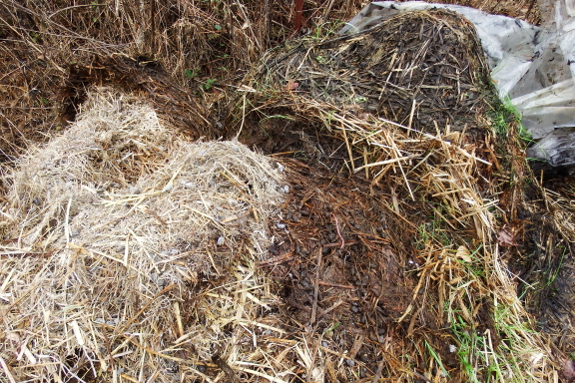
While turning the older
compost to incorporate it with the new, I discovered quite a few dry
patches like the one shown to the left in the photo above. I'd assumed I
needed to cover up the piles after about an inch of rain fell on them
to prevent leaching of nutrients, but it seems like I should have
allowed for at least twice that much rainfall pre-covering. Now that the
manure is in an even bigger pile, I probably should leave it out for a
solid month then take a look inside and see how well it's hydrating
before pulling out the tarps.
In case anyone's curious, this pile, unlike the other, doesn't get human pee. I figure the C:N ratio
of urine-soaked bedding with lots of goat berries is close to perfect
for compost critters. If you want to read far more about various types
of manures and other compostables, I recommend my Ultimate Guide to Soil. Enjoy!

It also burns fast. Next year, we'll have to track down a harder wood for that last log in the stove on winter nights.
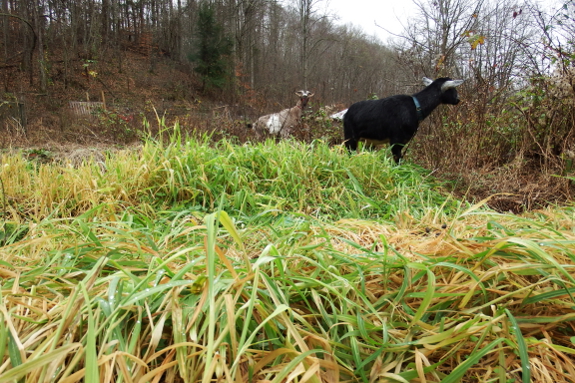
"Have some oats," I coaxed my grumpy goat.
"Hmmph," replied Abigail. "That isn't worth eating."
"Okay, how about some honeysuckle?"
"What, you expect me to pick one leaf at a time in that briar thicket!" my doe answered. "Where's my winter forage?!"
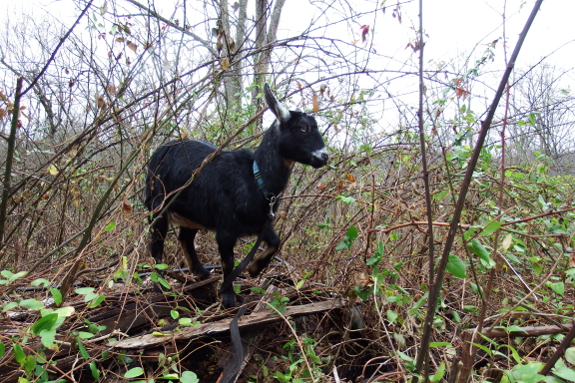
Last winter, we had decades of banked honeysuckle to pull off trees and barns and fencelines. But, unfortunately, we're just about out already.
Which isn't the end of
the world. There's scads of hay stored up in the barn and we've got
homegrown treats like butternut squash when the girls need something
fresh. Honestly, I think I miss the wild forage more than they do --- I
count on those hours outside with munching goats to counter the lack of
light during these short winter days.
So I'll have to put on my thinking cap and get smarter for next year. Maybe plant some willow trees in the gully?
Yes.
Abigail still needs to wear the gentle
leader when walking through the garden.
It increases the amount of control you have when your goat is on a
leash.
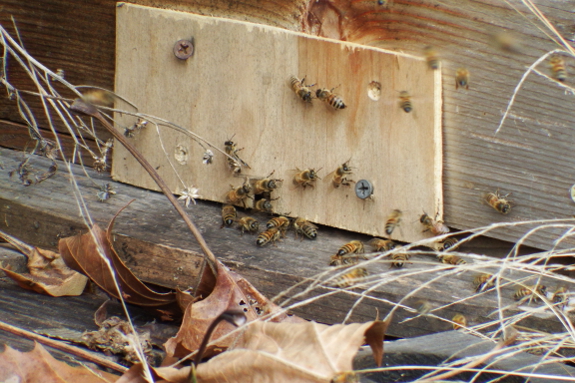
The outside world thinks it's spring. There are chickweed and speedwell and even a few dandelion flowers open. The wood frogs started calling in the woods (although they  haven't moved to the puddles yet). And Kayla informed me her hydrangea bush got so confused it leafed out.
haven't moved to the puddles yet). And Kayla informed me her hydrangea bush got so confused it leafed out.
Saturday, the bees got
into the act too. Workers from both hives were out flying, although I'm
not sure they made it far enough to find the flowers for a quick snack.
Since winter is far from
over, I anticipate we're all going to have a shock to our systems when
cold weather comes to call. But, for now, I'll take the advice of the
bees and enjoy the beauty of the day.
Our tractor trio gets along just fine despite being birds of a different feather.
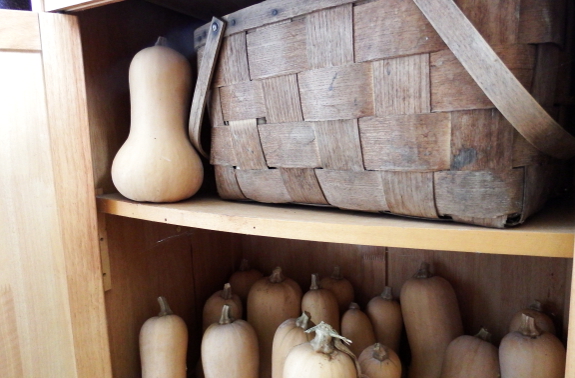
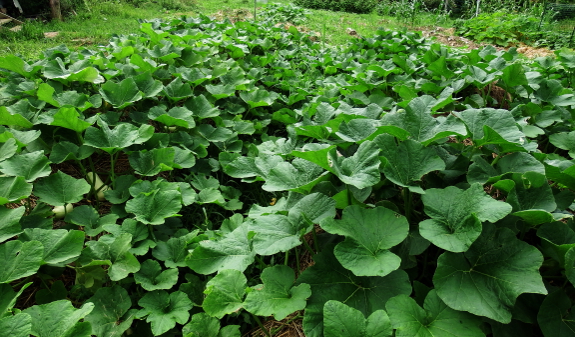 $3.95
for 30 butternut seeds. It sounded like a lot when I'd been saving my
own seeds for years and could likely refresh my supply at the dollar
store for under a buck. But I decided to splurge and try out a hybrid
butternut --- Metro F1 --- this year...and I was blown away.
$3.95
for 30 butternut seeds. It sounded like a lot when I'd been saving my
own seeds for years and could likely refresh my supply at the dollar
store for under a buck. But I decided to splurge and try out a hybrid
butternut --- Metro F1 --- this year...and I was blown away.
The resistance to powdery mildew meant my vines didn't succumb before they finished ripening fruits. So we ended up with about 200 pounds of winter squash with nearly no work.
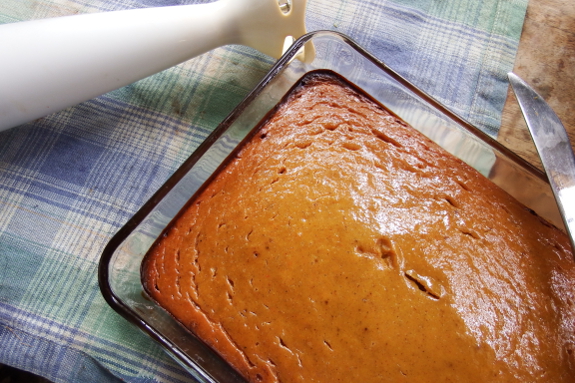 Then there's the flavor. So rich and sweet that our pies
and soups this winter have been a step above previous years' even
though I used the same recipes. Our milk goat gets a butternut squash
every two or three days, and she's yet to show any signs of boredom with
that portion of her diet. In short, Metro really is better.
Then there's the flavor. So rich and sweet that our pies
and soups this winter have been a step above previous years' even
though I used the same recipes. Our milk goat gets a butternut squash
every two or three days, and she's yet to show any signs of boredom with
that portion of her diet. In short, Metro really is better.
The frugal side of me
wants to save some seeds and see what I'll get if I plant them in next
year's garden. The smart side of me says that, at 2 cents a pound, I
should buy another packet of the hybrid and stick to a good thing. What
do you think?
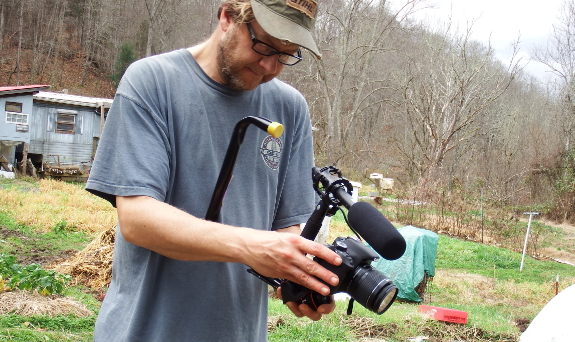
We recently upgraded to a
Canon T3i to give our blog videos a cinema look.
Stay tuned for a series of
brief Fall garden videos we shot today.
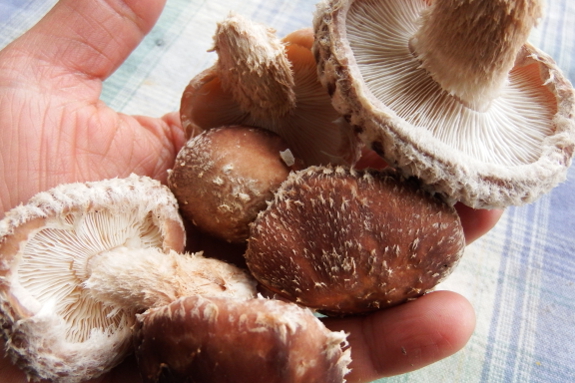
I wouldn't give up hope
yet, Deb. If you plugged your logs with shiitakes, they can sometimes
take up to eighteen months to bear, with the longer periods being due to
slower strains or harder trees (like oak).
Plus, different types of shiitakes fruit in different seasons. All of the mushrooms we've harvested so far from the logs plugged this past spring are the Snow Cap
variety, which (as the name suggests) fruit deeper into the winter than
most other types of shiitakes. So, for all I know, our WW70 and Native
Harvest logs might be fully colonized and just waiting on the right
weather cues to fruit. Yours might be too!
That
said, "under a tree" isn't really the best place for mushroom logs. In
my experience, there's too much sun beneath a typical fruit tree to
protect mushroom logs, especially once the leaves fall in winter. The
result can be split bark, dried out wood, and the rapid proliferation of
weed fungi. So, if you've got a shadier, damper place (but one raised a
foot or so off the ground), you might want to move those logs over. We
currently have our logs up against the north side of the trailer, and
it's definitely the best arrangement we've found for them yet.
Now, if we can just get their sprinklers going
next year to keep the logs hydrated during summer droughts, we might
just have happy mushrooms...and husbands. I think shiitakes might be
Mark's favorite crop!
The big thing I figured out with this video is how the auto focus feature seems to correct too often and is barely acceptable when your subject is moving.
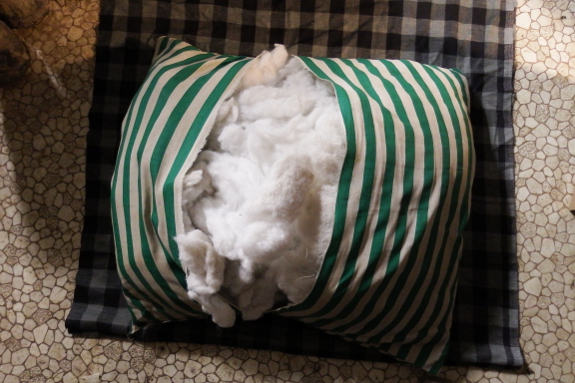
I went through a
seamstress stage in late high school and early college. But lately I
haven't sewn much. After all, most Americans are so obsessed with fashion
that I can get an entire 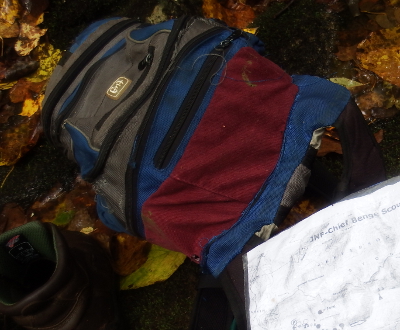 wardrobe for about $10 used and then wear it for a year or so until the knees fall out of my pants.
wardrobe for about $10 used and then wear it for a year or so until the knees fall out of my pants.
Still, it's handy to know
a few important stitches when I have something I really want to repair.
The fabric on the big pillow at the top of this post dry-rotted, so I
made it a new case in about half an hour of hand sewing. Similarly, the
patch I put onto my decade-old backpack last fall is still going strong.
Gotta love the back stitch!
Anna shares tips on how awesome our brussels sprouts yield was this year.
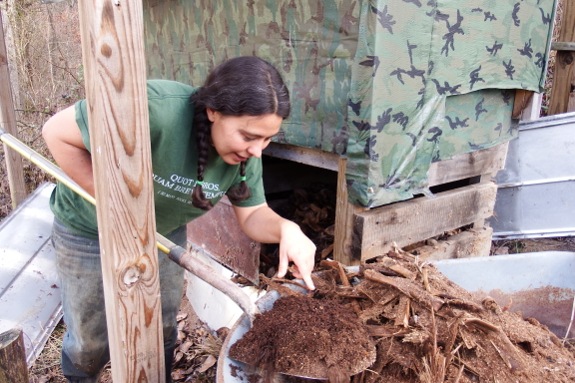
I finished cleaning out the 2014 humanure this week. In the process, the metal that was covering one side of the 2015 bin fell away and revealed this:
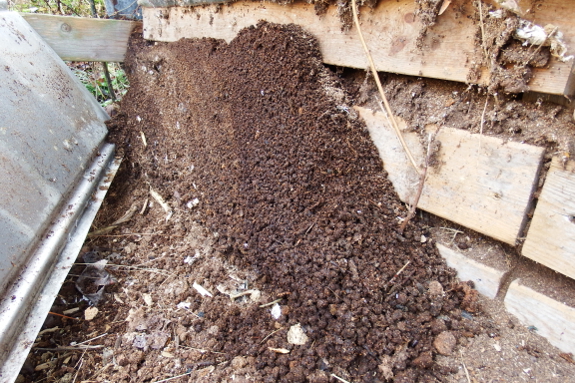
The finding was even more thrilling than this morning's excitement --- watching heat rise off my biggest compost pile. (Yes, I do get quite a kick out of the simple things in life.) Can you tell what's going on?
If you guessed that black-soldier-fly larvae
moved into our composting toilet, you were right! We'd had hints of
this invasion earlier in the year, but this was the final confirmation
of the symbiosis.
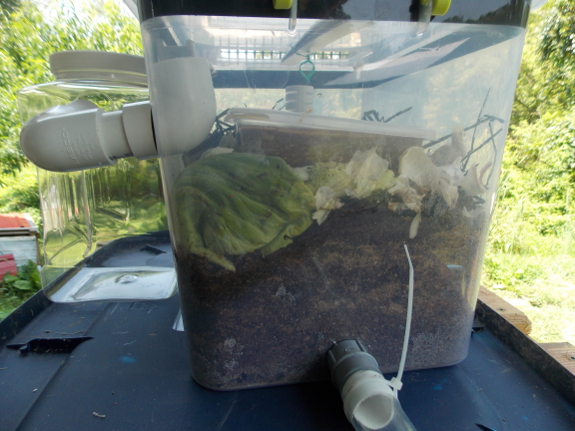 What
had we seen earlier? First, Mark noticed that if he shone a light down
the hole at night, the excrement writhed with the motion of little
grubs. (I can't think why he never took a picture....) Second, I kept
putting off changing over to a new hole because the 2015 humanure bin
never seemed to fill up. Either we weren't using the bathroom as much as
we did in previous years (unlikely), or something was digesting our
waste as fast as we dropped it down the hole.
What
had we seen earlier? First, Mark noticed that if he shone a light down
the hole at night, the excrement writhed with the motion of little
grubs. (I can't think why he never took a picture....) Second, I kept
putting off changing over to a new hole because the 2015 humanure bin
never seemed to fill up. Either we weren't using the bathroom as much as
we did in previous years (unlikely), or something was digesting our
waste as fast as we dropped it down the hole.
I suspect the new addition to our composting-toilet ecosystem began when we bought black-soldier-fly eggs to seed our compost bin
in 2014. The insects built up quite a population over the course of the
summer and fall, but I wasn't able to get the flies to recolonize the
bin this year. (Admittedly, I didn't try very hard.) Looks like they
found a place they liked even better.
If you want to read more about how to incorporate composting toilets and
black soldier flies into your homestead, you can check out The Ultimate Guide to Soil.
Preorder now and the book will show up on your doorstep right around
black-soldier-fly time in 2016. I hope you enjoy it as much as I enjoyed
experimenting and writing it!
Thanks for all the nice
comments on our recent homesteading videos.
One of our goals for 2016 is
to reach out to more people through
Youtube by making good short videos on more of the things we do around
here.
Why are we adding more videos
to the blog? The main reason is that the
chicken watering business
has slowed down to a trickle which means it's
time to create a new revenue stream or go back to substitute teaching.
What can you do to help? Keep
reading the blog, tell a friend,
subscribe to our Youtube
channel, click the thumbs up button if you
like the video. Suggestions are welcome from any of you readers that
use Youtube to supplement your income.

Mark and I make the
perfect couple; I break things. He fixes things. Sometimes I even buy
things pre-broken to ensure my sweet husband has enough to do.
More seriously, since Mark stole my Christmas lights to illuminate the chicken coop (more eggs!), I decided to try out some of those new-fangled solar lights that are on the market nowadays. I didn't quite think through the fact that the reason I like lights around the  solstice
is because the days are very short and often quite cloudy, which puts a
kink in the recharge plan. After the first evening of pretty lights, my
string of bulbs barely glowed in succeeding days.
solstice
is because the days are very short and often quite cloudy, which puts a
kink in the recharge plan. After the first evening of pretty lights, my
string of bulbs barely glowed in succeeding days.
Mark figured the problem
might not actually be the season but the ultra-cheap battery. So he took
out a few screws, changed over to a higher quality rechargeable, and
suddenly my evenings were once again colorful and merry.
Thanks, honey! And, yes, I
know --- this string looks like it would be an even better fit for the
chicken coop. (No need for a timer.) But you can't have it --- it's
mine!
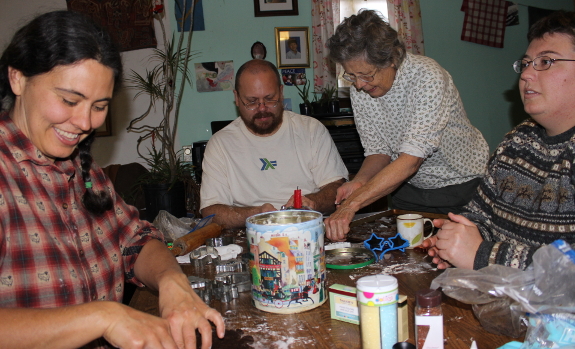
We celebrated Anna's birthday today by making Christmas cookies in Bristol.
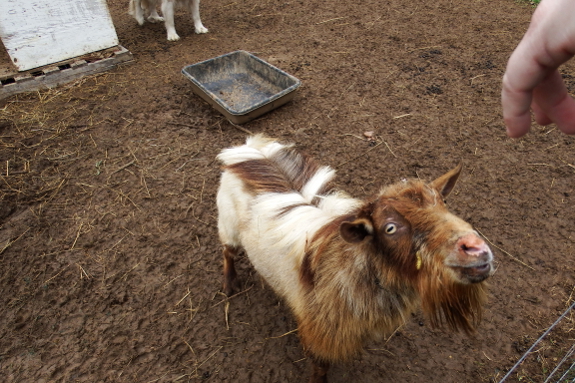
One of the problems with
goats in the winter is mud. Even if you pick a very well-drained spot
for them, they'll tend to hang out at the gate closest to human
activity. The result is trampled up mud, like this.
(In case you're curious, this is one of the bucks Artemesia turned down during her driveway date. She had three choices --- such a lucky girl!)
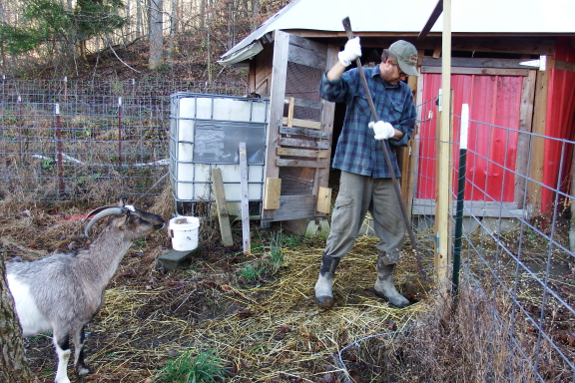
Our caprine companions
deal with the issue by finding stumps to stand on, which keeps their
hooves dry but still leaves me feeling like a slacker goatkeeper. So
Mark finished off the gate he'd been adding to pasture two so we could rotate the girls over.
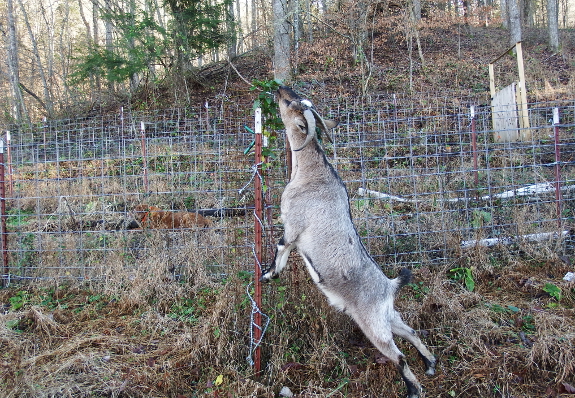
I'd like to say we'd stockpiled winter forage
for the goats to enjoy in this new pasture, but we're not to that point
yet. Abigail ate the few honeysuckle leaves she'd missed during her
previous occupation, then the girls went back to the barn to dine on
hay. At least they won't have to walk through mud for a few weeks now.
I'm curious to hear what
others do about mud-pits in their winter pastures. Do you lay down
gravel in those sacrifice areas, have big enough pastures that the goats
don't congregate in the same spot all the time, or something entirely
different?
This Bell 12 volt compressor helped us to air up our low truck
tire long enough to get to a local tire shop for repairs.
The guy we took it to
believes in a coat of sealant or paint on the rim after it's cleaned to
insure the seal won't fail again anytime soon.
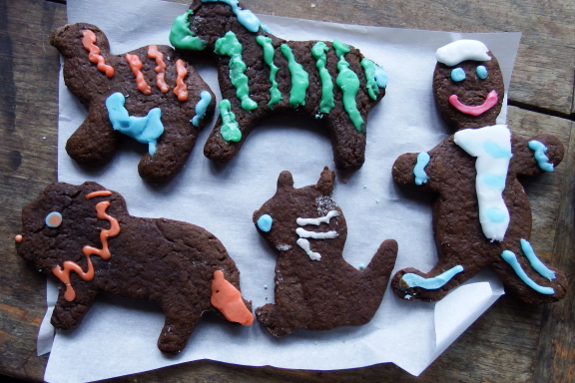
A cookie-decorating party
has been my favorite birthday so far. While the events are fresh in my
mind, I thought I'd sum up what I learned in case you want to replicate
the cheap, fun entertainment.
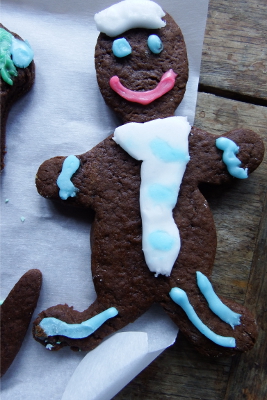 1. Start with a basic gingerbread man recipe. I used the one in Joy of Cooking:
1 stick butter, 1/2 cup brown sugar, 1/2 cup molasses, 3.5 cups flour, 1
teaspoon baking soda, 0.25 teaspoons allspice, 0.5 teaspoons cinnamon, 2
teaspoons ginger, 0.5 teaspoon salt, 0.25 cups of water. Make the dough
ahead and chill.
1. Start with a basic gingerbread man recipe. I used the one in Joy of Cooking:
1 stick butter, 1/2 cup brown sugar, 1/2 cup molasses, 3.5 cups flour, 1
teaspoon baking soda, 0.25 teaspoons allspice, 0.5 teaspoons cinnamon, 2
teaspoons ginger, 0.5 teaspoon salt, 0.25 cups of water. Make the dough
ahead and chill.
2. Focus on a few basic colors for your icing.
To mix up the icing, just combine confectioner's sugar with a small
amount of water to make a paste, then add drops of food coloring to
change the hue. Remember, your cookies will be very dark-colored, so
lighter icings will look good in contrast. This process doesn't take as
many mixing bowls as you'd think since you can make white first, then
red, then orange, all in the same bowl. Repeat with blue and green. When
each batch is done, spoon the icing into the corner of a sandwich bag
or ziploc bag and punch a small hole in the plastic with a wooden skewer
so you can squeeze small lines out.
3. When rolling out your cookies, try not to use much flour on your pin since you want the top surface to be dark and pristine.
Keep the cookies relatively thick so they can be used as ornaments on
your tree and bake at 350 Fahrenheit until the tops just barely lose
their shine. Cool a few minutes on a rack, then transfer to plates to
decorate. (If you don't own cookie cutters, this set is perfect for homesteaders.)
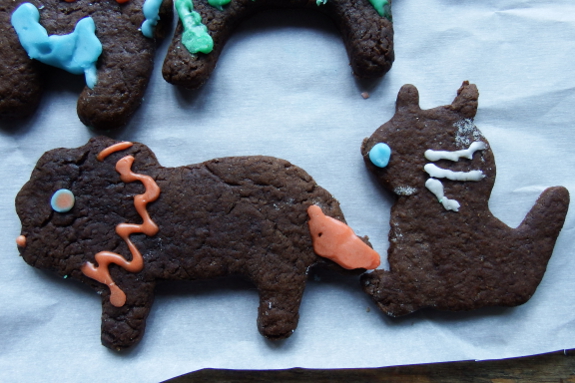
4. Less is more in the decoration department.
Think like a cartoonist and focus on just a few key areas --- the mane
of a lion, the whiskers of a cat, the hooves of a horse. (And don't
smudge your cat with flour like I did!)
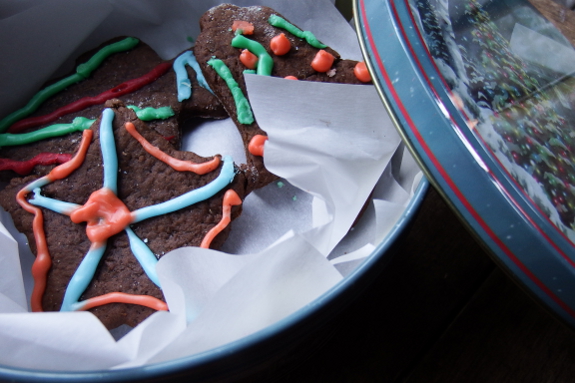
5. Plan ahead with waxed paper and tins to pack away the finished cookies.
The icing needs to dry for a few minutes first on a plate, but then
they can be stacked carefully in the tin. These make great edible gifts.
I hope you have fun! Maybe next year I'll get more creative and hand-cut my gingerbread to make a farmyard scene.
Hopefully touring our imperfect goat barn will help you plan your own to create a better equation.
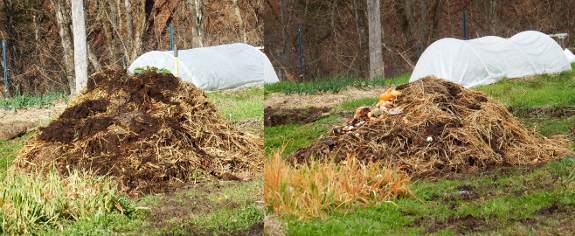
It's amazing what a different twelve days can make to a compost pile.
I suspect the chicken manure was largely responsible for the fast
heating and the equally fast slumping in this case. No matter what the
cause, by the time our most recent cold spell hit, the pile was no
longer breathing out visible hot air and it had also lost about a third
of its bulk. Time to regroup a little bit.
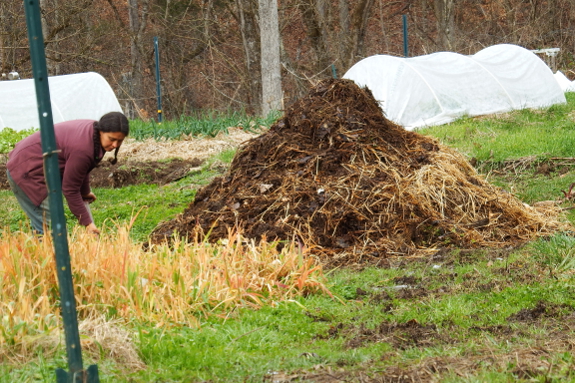
I didn't exactly turn the
pile. Instead, I forked up some of the outer perimeter that had sunk
down to below critical mass for composting. Now the pile is about as
tall as it was before once again, but it's more pyramidal and
considerably smaller in total volume. I'll be curious to see if it heats
up again or just slow cooks for the rest of the winter.
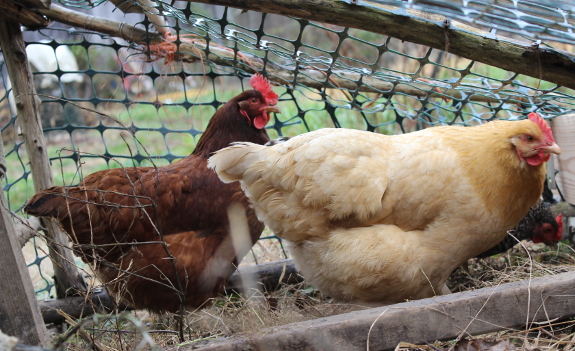
When I was taking a picture
last week for an update
to our chicken tractor hens I forgot to reset a bucket that was
blocking a gap where the ground was uneven and they escaped to plunder
the mulch in our garden.
We ended up chasing them back
into the coop with the main flock, but the next day they clearly wanted
back into their tractor of solitude.
Anna mentioned their laying
ratio is higher than the main flock which we give supplemental
light to.
Maybe the threat level of a
few chickens in a tractor is lower than being in a flock with the
freedom of free ranging in a forest?
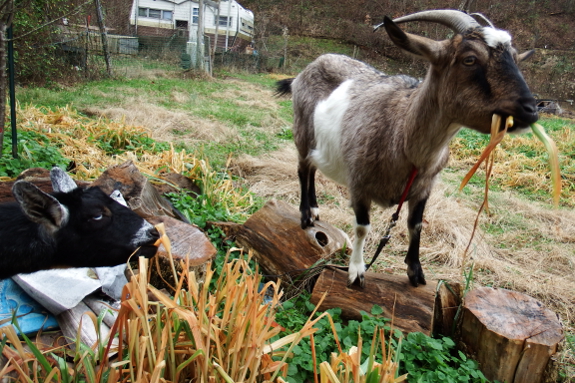
 Happy
Winter Solstice! Or, for those of you who celebrate Christmas,
Chanukah, Ramadan, Kwanzaa or the Festival of the Radishes, please
accept my apologies for my holiday wishes being premature or belated.
Happy
Winter Solstice! Or, for those of you who celebrate Christmas,
Chanukah, Ramadan, Kwanzaa or the Festival of the Radishes, please
accept my apologies for my holiday wishes being premature or belated.
Speaking of the holiday
season, I thought you might enjoy seeing the card I made for Mom to send
to her relatives. The astute reader will recognize some of these images
from the blog!
Of course, if Mark and I
were going to make our own holiday card, chances are it would revolve
around goats. So I'll fill today's post with a little caprine cheer just
in case you lack hooved companions of your very own.
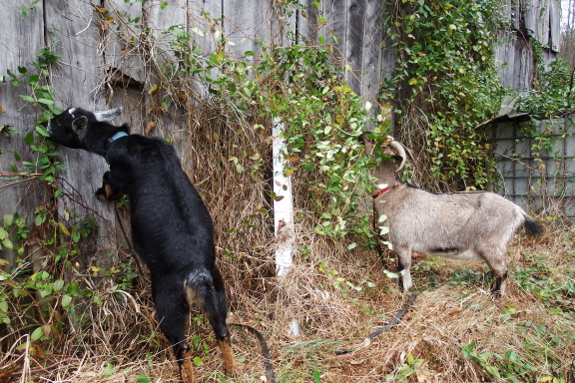
Abigail says: "Winter holidays are about feasting. Give me more honeysuckle!"
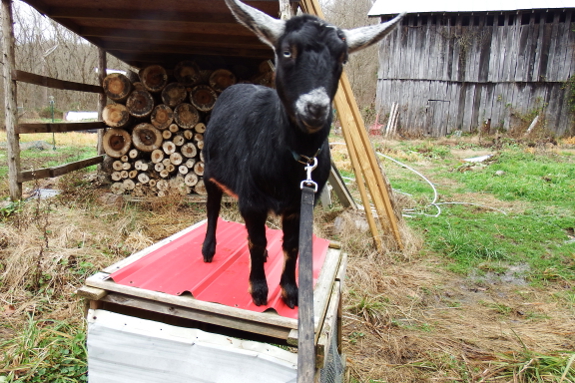
Artemesia says: "Winter holidays are about fun. If it's more than a foot tall, I want to stand on top of it. You try!"
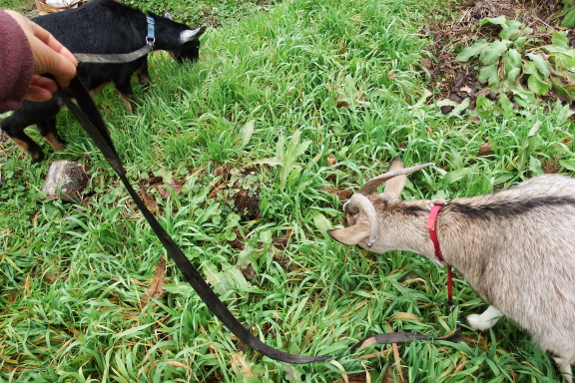
From our farm to yours
--- may your year ahead be healthy, happy, and full of inspiration.
Don't get pulled in too many different directions and do remember to
savor the moment. It's all uphill from here!

Focusing on one film class
this past semester was so fun and stimulating that I decided to sign up
for another film class for the Winter term.
The picture above is from a
recent shoot where I'm helping a classmate with sound production.
Check out her Tone
Deaf Films Face Book group for more details on when this funny
slasher spoof will be ready to view.
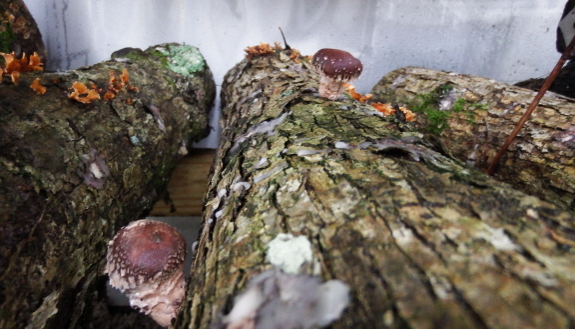
My sister and I were
discussing New Year's resolutions the other day. Unlike most people, I
like to think of them as goals rather than resolutions and I prefer to
immediately set up action steps to make them a reality. Still, the start
of a new calendar year does seem like a good time to mull over the
annual goals.
That said, during our early years on the farm, I overwhelmed us with huge numbers of goals
that were really window-dressing rather than reaching to the heart of
what would make us truly sustainable and happy. Recently, I've changed
gears a bit and instead focus on one annual goal that's so deceptively
simple I can write it in a single sentence.
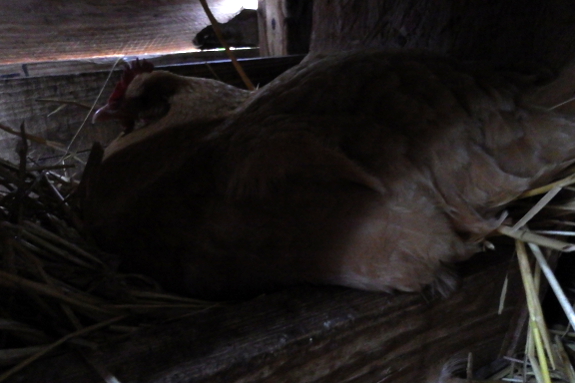
In 2014 and 2015, my goal
was to take one work day off per month just for fun. No, it doesn't
count if I'm going to the dentist or planning Thanksgiving. There might
be fun involved in both those activities, but neither one works to
counter my workaholic tendencies. Instead, the free day has to be
devoted to exploring a park or just swallowing a good book --- pure
unvarnished pleasure with no obligatory springs attached. I failed at
this goal in 2014, but did so well this year that I was no longer
sliding my free day off into the very end of the month just to say I did
it.
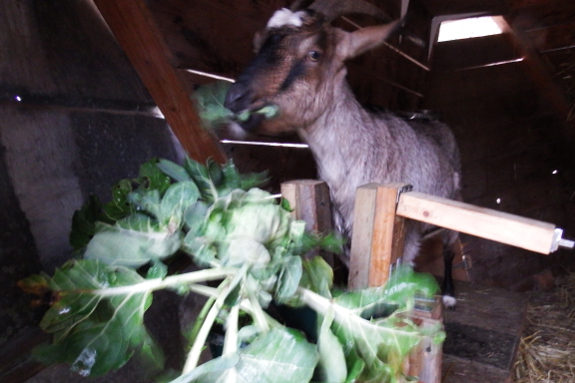
Having achieved my goal
at last, I'm now ready to move on to a new resolution. So in 2016 my
goal is to add another just-for-fun day per month, but this one will be
devoted to long hikes like the one I enjoyed this fall. Now I'm off to
research medium-distance trails within easy driving distance and plan
out next year's fun!
(By the way, in case
you're curious, the photos in this post from top to bottom are:
shiitakes we hope to eat for Christmas, a broody hen who's got her
seasons mixed up, and Abigail eating a spent brussels sprout plant.)

Mark and I just got back from watching The Force Awakens with our movie-star neighbor.
I'm pretty sure Mark's going to need to digest the film for the next
several hours, so you get a glib Anna post rather than a thoughtful Mark
post.
I won't spoil it, but
will say if you loved episodes four through six, this movie is even
better. In a way it's grossly derivative of those original stories but
there's enough different that it's like watching the whole thing over
again with fresh eyes...and with vastly superior special effects and 3D.
The characters are top-notch, the landscapes are unbelievable (filmed
in Iceland, Abu Dhabi, etc), and the feel is spot on.
And there is no kid-friendly but adult-bane Jar-Jar Binks.
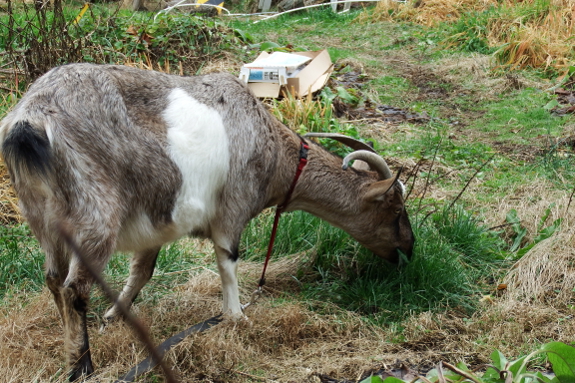
This winter has thus-far
been as abnormally mild as last winter was abnormally cold. Usually, our
grass is entirely dormant by now, but new growth keeps popping up to
our goats' delight. And we're barely delving into the quick-hoops greens
yet since there's still masses of kale and brussels sprouts to eat in
the main garden. Our firewood supply is also in particularly good shape since it looks like we're only going to use half as much wood as 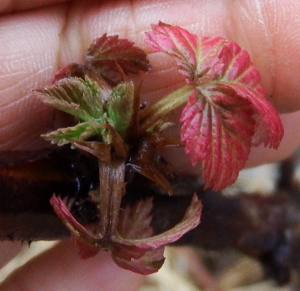 I'd
alloted for December despite lighting the stove whenever Huckleberry
complains about the interior temperature dropping below 62.
I'd
alloted for December despite lighting the stove whenever Huckleberry
complains about the interior temperature dropping below 62.
On the other hand, a few plants are getting confused, especially since we had a cold spell in November to pile on the chill hours.
During our jaunt to the big city yesterday, I noticed cherry trees
blooming along the streets. And even though our fruit trees thus far
seem to still be asleep, a few fresh leaves are poking out on certain
raspberry canes. This kind of midwinter growth is almost certain to be
frozen in the near future.
I'd be concerned about
bad bugs not getting knocked back enough by a mild winter, but our
weather is as changable as Huckleberry's moods. So I think chances are
pretty good we'll still see a cold spell before true spring comes 'round
again.
Anna gave me a tough choice
to make today.
Butternut
squash pie or home made cinamon buns for a holiday dessert?
Cinamon buns won out
today...but it was a close call.
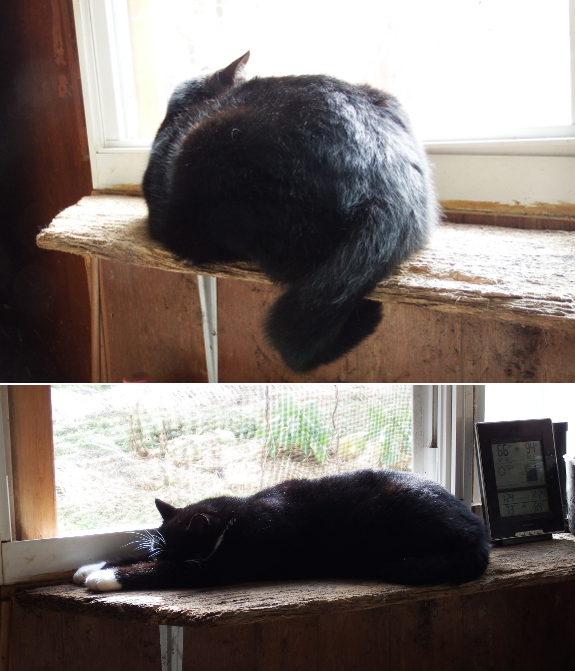
We've been doing some
heavy visiting in the last week. I enjoy the time with friends and
family, but each trip off farm makes simple afternoons at home feel that
much more enticing. With our social agenda finally cleared, we spent
Christmas Eve emulating Strider --- relaxing.
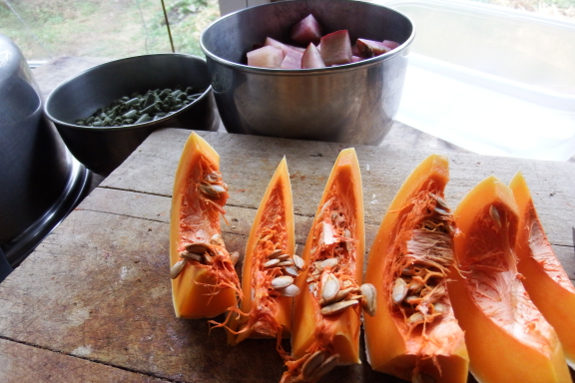
I thought you might enjoy
some random shots from a simple, non-work day. Here's the goats'
breakfast --- alfalfa pellets, mangels, and butternut squash.
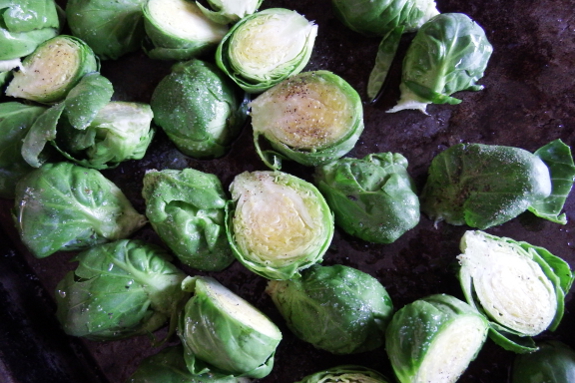
And part of our lunch ---
brussels sprouts. With big sprouts like the ones we've been getting
this year, they roast better if cut in half (or even in quarters).
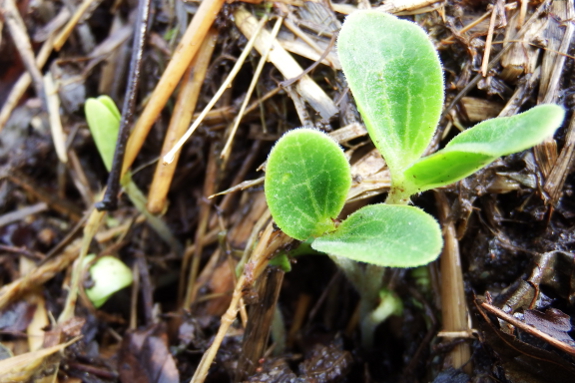
More signs of this crazy warm weather --- summer squash sprouting out of the compost pile.
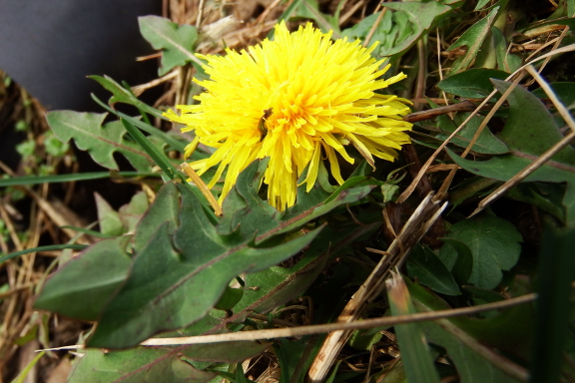
And a dandelion in full bloom to trick us into thinking it's spring.
I hope you're enjoying this crazy burst of summer in midwinter as much as we are!

Some classmates of mine made
an awesome
short film using the Super 8 format.
It was shot on top of Roan
Mountain and I think they did a beautiful job.
Thanks in advance if you've
got the time to vote after watching. Voting is only open another 4 days
and you can vote one time each day. Make sure to text back the
confirmation code and thanks again for helping. Our Film Club gets a
substantial prize if they win and I think they've got a good shot at it.
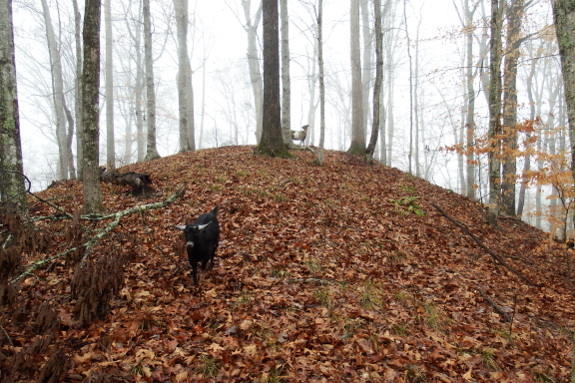
How can you tell if your
goat is in heat? If you've got a buck around, she'll suddenly be
interested in him. But even without a buck, heat signs are pretty
obvious once you know your individual animals.

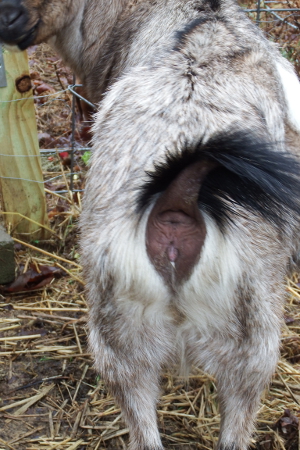 When
Abigail's in heat, she stands outside even when it's damp (despite
hating water). And she yells even though she's usually nearly silent,
emitting long, bleating moans that sound like she's dying. I can only
assume she thinks she'll manage to call a buck into her pasture if she
yells loud enough.
When
Abigail's in heat, she stands outside even when it's damp (despite
hating water). And she yells even though she's usually nearly silent,
emitting long, bleating moans that sound like she's dying. I can only
assume she thinks she'll manage to call a buck into her pasture if she
yells loud enough.
Vaginal discharge that's
usually milky whitish is another good sign. Even if you don't catch the
mucous hanging out on her vulva, you can usually notice the discharge
dried on the underside of her tail, a clear sign that she's in the depth
of heat. You may also notice that her vulva is a bit reddish and/or
puffy at the same time.
Another thing to keep an
eye on in the nether region is flagging. Some goats like to wag their
tails much like a dog, but once you see flagging you'll be able to
easily distinguish it from wagging. First of all, your doe will flag
when nothing happy is happening. Second, the latter behavior is more of a
rapid back and forth motion with the tail held relatively low. I don't
know this for sure, but I've been assuming the flagging is meant to
spread the doe's in-heat scent to the nearest buck, thus all the fast
fanning motions.
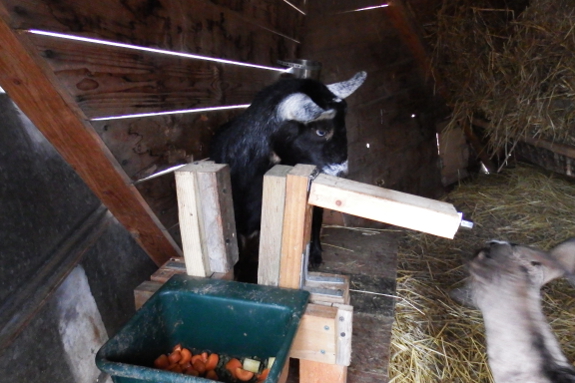
A less obvious sign (but
pretty striking in Abigail) is lack of an appetite. In the photo above,
you can see her less dominant herd mate sneaking Abigail's breakfast.
Usually, poor Artemesia would have been butted off the milking stand by
now. But when Abigail's in heat, she's far more interested in yelling
than eating.
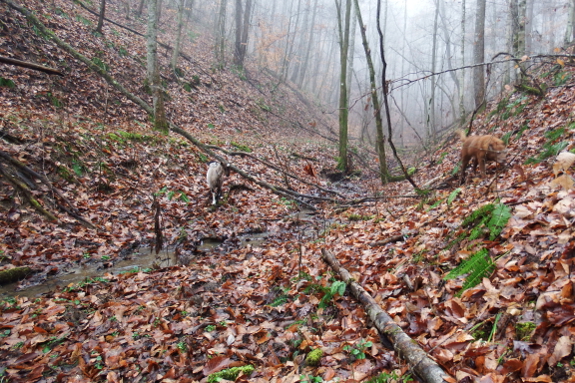
If you're looking to
breed your goat, you'll want to mark each heat on your calendar so you
know when to expect the next one. Goat heats are usually about three
weeks apart, and once your goat goes into heat you have anywhere from 6
hours to 3 days to get her bred.
Or, if you're giving your
goat a year off like we are with Abigail, taking her on a nice long
walk while she's in heat seems to help her feel a little better about
the no-buck situation. At least she thinks she's looking for a buck, despite not managing to find one.
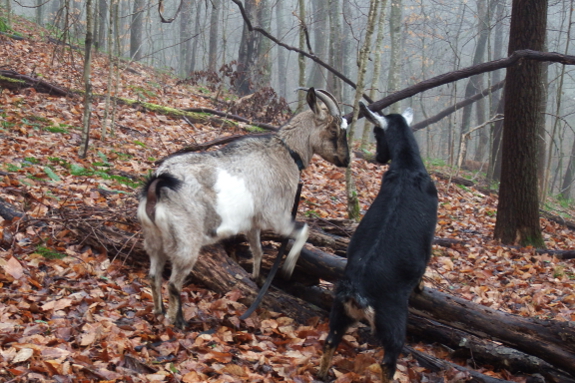
Since Artemesia has now gone four weeks since her last heat, we're relatively sure her driveway date stuck and she's pregnant. So mark your calendar for late April --- hopefully she'll pop out at least one girl!
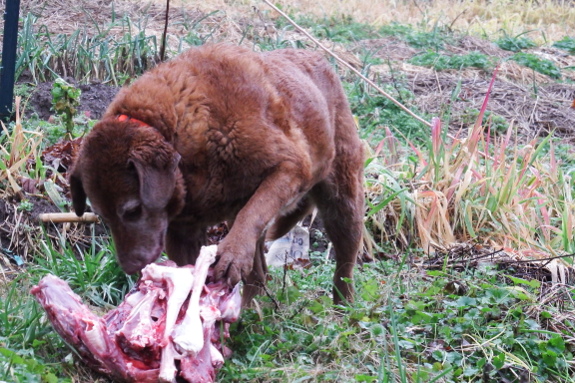
We froze parts of the deer Anna killed
last month that we didn't want to process but thought Lucy would
appreciate.
Happy Boxing Day Lucy.

Mark came down with a cinnamon-bun craving
this year. And after he brought home cans of dough a couple of times, I
told him I was pretty sure I could make something better from scratch.
So I played with a few recipes, tweaking them until they were still
decadently delicious but didn't give me such a sugar high that I crashed
an hour later. And Mark's favorite cinnamon buns were born.
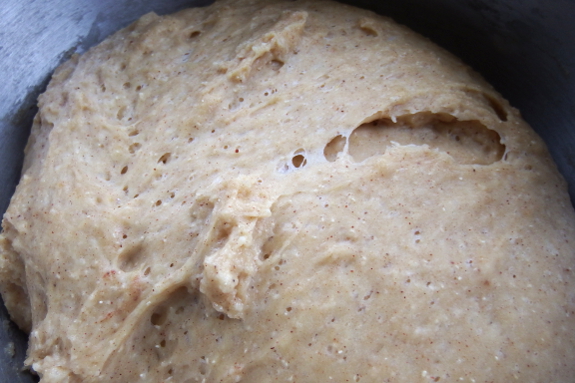
You'll need to start
about five hours before you want to eat since cinnamon buns are
basically a sweetened yeast bread. For the dough, mix:
- 3.5 cups of all-purpose flour
- 1 package of rapid-rise yeast
- 1/3 cup of white sugar
- 2 eggs
- 1 cup of whole milk, warm
- 4 tablespoons of butter, melted
- 2 teaspoons of cinnamon
- 1 teaspoon of salt
If you're using
rapid-rise yeast, you don't need to proof the leavening. Instead, just
pour all of the ingredients into a bowl, put the bread-hook attachment
onto your mixer, and mix at medium speed for a few minutes until the
dough is fully combined. (Or you can knead by hand until you get the
same results.)
Now cover the dough with a damp dish towel and set it in a warm place until it doubles in bulk (about two hours).
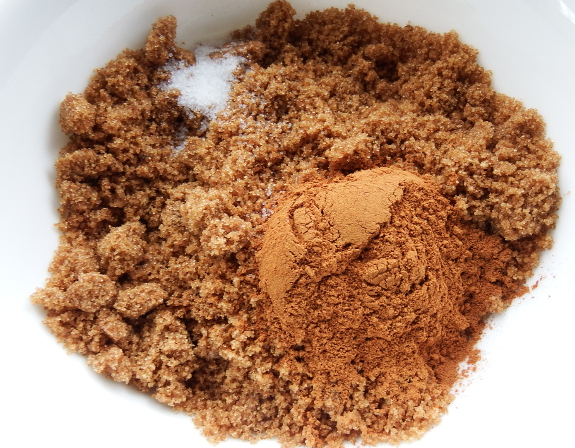
Once the dough's ready, mix up the filling:
- 3/4 cup of brown sugar
- 4 teaspoons of cinnamon
- 1/8 teaspoon of salt
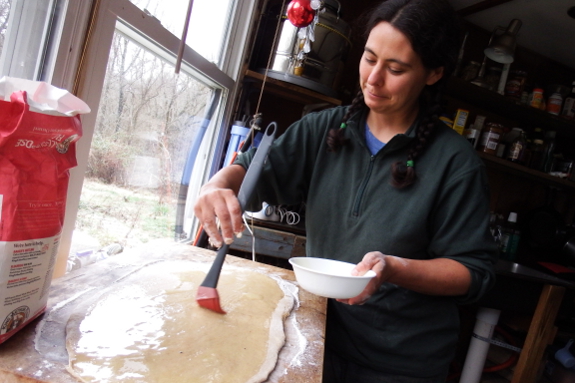
Flour a clean surface and
roll out your dough until it's about as big as you see in the picture
above. You want it to be a rectangle rather than a square, but the exact
dimensions are up to you. A bigger rectangle will mean your rolls have
more layers but a smaller thickness of cinnamon-sugar in between each
one.
Now melt:
- 4 tablespoons of butter
Brush the melted butter
onto the dough, leaving about an inch on each long side uncovered. The
unbuttered regions will stick together better so your cinnamon rolls
won't unravel as they rise and bake.
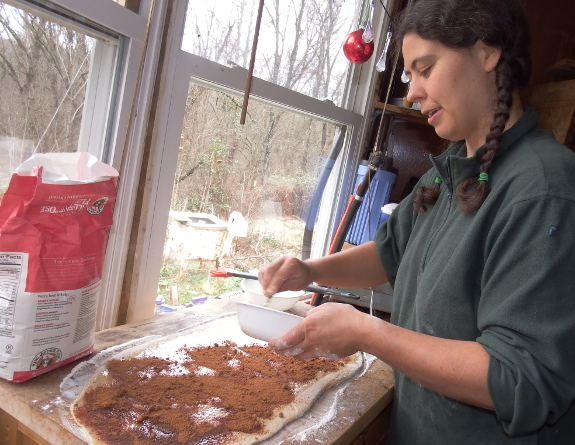
Sprinkle the
cinnamon-sugar mixture on top of the butter as evenly as you can. Then
roll up the dough to make one long cylinder. Using a sharp knife, cut
the roll into sixteen equal pieces. (This is easiest done by cutting the
roll in half, then each half in half, then each quarter into quarters.)

Butter a 9x13 dish or two
8-inch round cake pans. Place the cinnamon rolls in the pan relatively
close together so they'll merge as they rise. Then set the dish(es) in a
warm place to rise again for another two hours (or more or less
depending on the temperature of your kitchen).
When the rolls have
nearly doubled in bulk, place a rack in the middle of your oven and turn
it to 350 degrees Fahrenheit. I like to put my pan in the oven as it
preheats so the rolls get one more fast rise before they bake into
place. Using that method, they usually need about 13 minutes to fully
bake so the bottoms are brown, the tops are very lightly touched with
brown, and the centers are cooked through.
While the rolls bake, mix up your icing:
- 1/2 cup of confectioner's sugar
- 1 scant tablespoon of whole milk
- 1/4 teaspoon of vanilla
Stir the icing until it forms a thick batter.

As soon as the buns come
out of the oven, drizzle the icing over the hot rolls. I simply get a
spoonful of icing and let it drip over the edge of the utensil to make
lines across the buns. (Sometimes I mess up and make blobs, but Mark
doesn't seem to care.)
This recipe makes 16
buns, which are best served warm. Nuke each one for 15 seconds in the
microwave if you let them get cold. Enjoy!
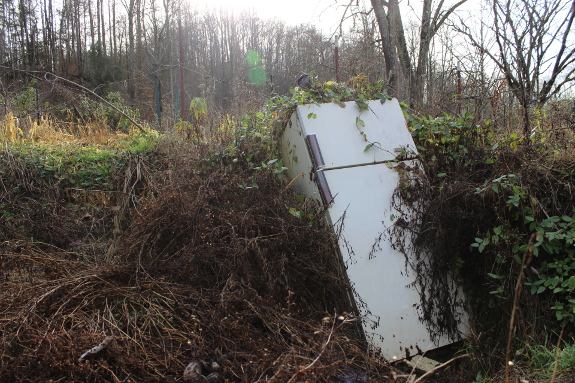
We've got carrots for the
goats and apples for Anna in the refrigerator
root cellar.
Normally we'd have a small
heater to keep it from freezing on really cold days and nights, but
this El Nino Winter has yet to show its teeth.
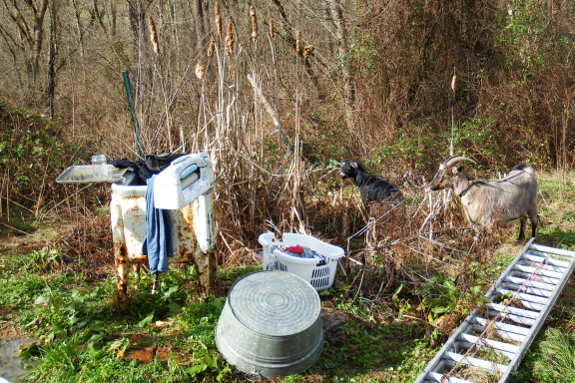
The sun came out to join the summer weather. A perfect day for laundry.
The herd decided to help me out, nibbling on dried-up cattails and fresh honeysuckle while I operated the wringer. Abigail also came over to take a look at some laundered rags, but she soon decided the cartoons are wrong --- goats don't like fabric.
I started using a clotheline
tightener on our hanging heated bucket waterer.
It's easy to adjust the
height for deep bedding levels or chicken growth.

We went hunting chicken of the woods mushrooms this weekend on the off chance the huge log we found in September would have put out another flush in this warm, wet weather. But it seems chicken of the woods is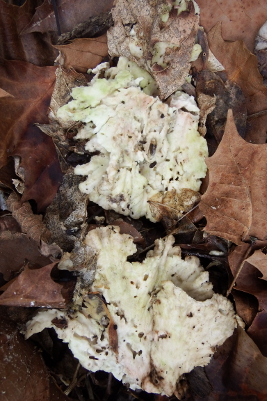 much more seasonal than the oysters we've been picking in our own woods.
much more seasonal than the oysters we've been picking in our own woods.
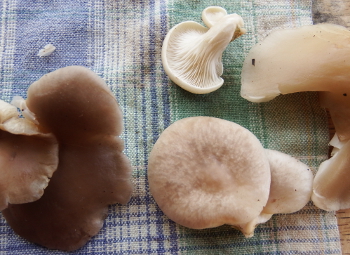
Among the latter species,
I've been noticing that one stump just past the edge of our core
homestead has a much darker cap than the usual wild type, more like one
of the varieties we plugged into logs from purchased spawn several years
ago. I wonder if we're introducing new fungal strains to the local
woods, and what impact that will have on the ecosystem? The effect on
our dinner plates is definitely positive.
This might be our first Winter where we carry over enough firewood to have two sheds full by next Winter.
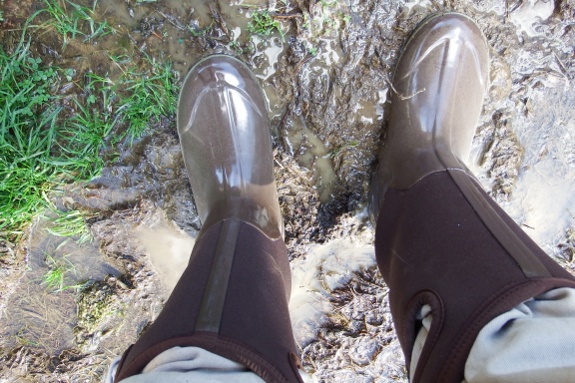
Another year, another pair of waterproof boots
to be replaced. And each time, I start out with firm plans to make my
new footware last longer. I'll only wear them in the muddiest parts of
the farm, I promise. I'll definitely steer clear of briars and will wear
the leaky pair instead if water isn't going to rise higher than my
ankles.
Then I get lazy. Boots
like this are so easy to pull on and off when you just need to dance
through the muddy yard to pick some supper lettuce. Might as well wear
them while doing my chores so I don't track in as much muck. And who
knows when I might be called upon to wade across the creek.
Then, three hundred or
six hundred or a thousand miles later, it's winter again and my boots
have once again sprung a leak just when I need them most. Which is when
my mother-in-law comes through and buys me new boots for Christmas even
though I'd considered putting off the purchase for another month or two.
Thanks, Rose Nell! My feet are dry and, this time, I'm really going to
be careful so they'll go the distance. Except....
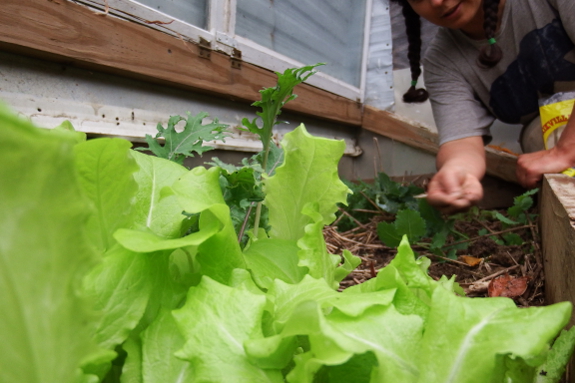
The cold frame lettuce is ready to eat, but there's not much of it.
So we're planting some new seeds in the gaps, aiming for twelve months of fresh greens.
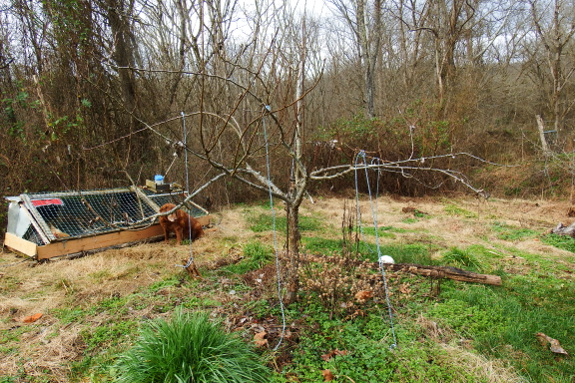
One of our readers wrote in a few weeks ago to ask about fertilizing a non-bearing fruit tree. The truth is that if you did a good job building your soil's organic-matter levels early 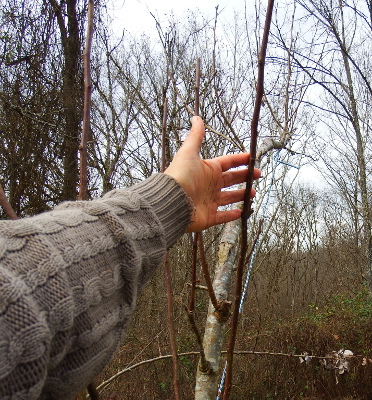 on
in the tree's life, it might not need to be fed at all until it sets
fruit. Instead, you can get away with mulching well to keep down weed
competition while also making sure you're only drawing on the
organic-matter interest rather than using up the capital.
on
in the tree's life, it might not need to be fed at all until it sets
fruit. Instead, you can get away with mulching well to keep down weed
competition while also making sure you're only drawing on the
organic-matter interest rather than using up the capital.
It's easy to tell whether
you should have fertilized by assessing the next season's twigs. Did
you see sufficient new growth or did the tree seem to stand still? At
the other extreme, if you see lots of long watersprouts like the one I'm
pointing out in the photo to the right, then you probably
over-fertilized and need to cut back on your feeding campaign next year
so your tree doesn't wear itself out making branches you're just going
to have to prune off.
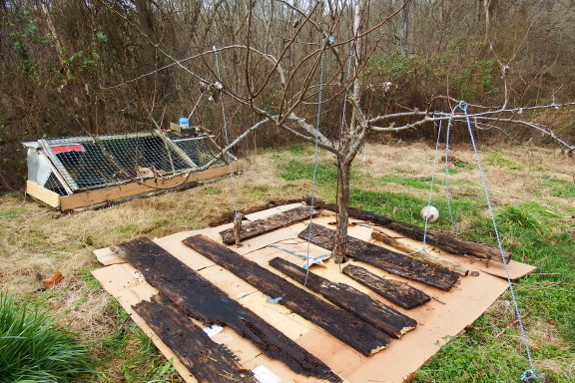
If I had access to
unlimited resources, I'd mulch heavily with rotted wood chips and/or
autumn leaves for non-bearing trees. In the real world where I'm
carrying most organic matter half a mile on my back, I make do with a
solid cardboard kill mulch weighed down with old boards or punky
firewood. The cardboard directly under the weights will rot away
relatively fast, but the uncovered cardboard sometimes sticks around for
nearly a year, especially when sheltered by a leafy tree canopy. And
the wood eventually breaks down to --- you guessed it --- feed the soil.
The only trouble is I've
now used up all of my Christmas cardboard, both the stash from Mom and
the pick-me-up delivery that Kayla's husband Andy treated me to earlier
this week. (Thank you!) Maybe I can talk them into wrangling a little
more cardboard to finish up the last of my unmulched trees....
The last time we cut down a
tree the angle was off and it went the wrong way.
Watching a tree cutting wedge
video on Youtube helped me to realize we needed some felling
wedges and more training on how to use them.
I plan to watch the video a
few more times before I cut down our next tree.
Want more in-depth information? Browse through our books.
Or explore more posts by date or by subject.
About us: Anna Hess and Mark Hamilton spent over a decade living self-sufficiently in the mountains of Virginia before moving north to start over from scratch in the foothills of Ohio. They've experimented with permaculture, no-till gardening, trailersteading, home-based microbusinesses and much more, writing about their adventures in both blogs and books.
